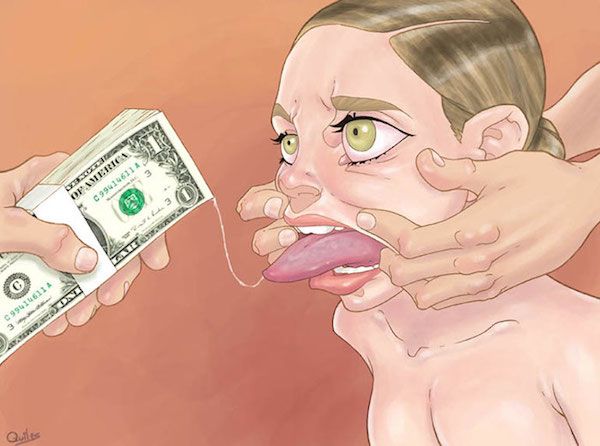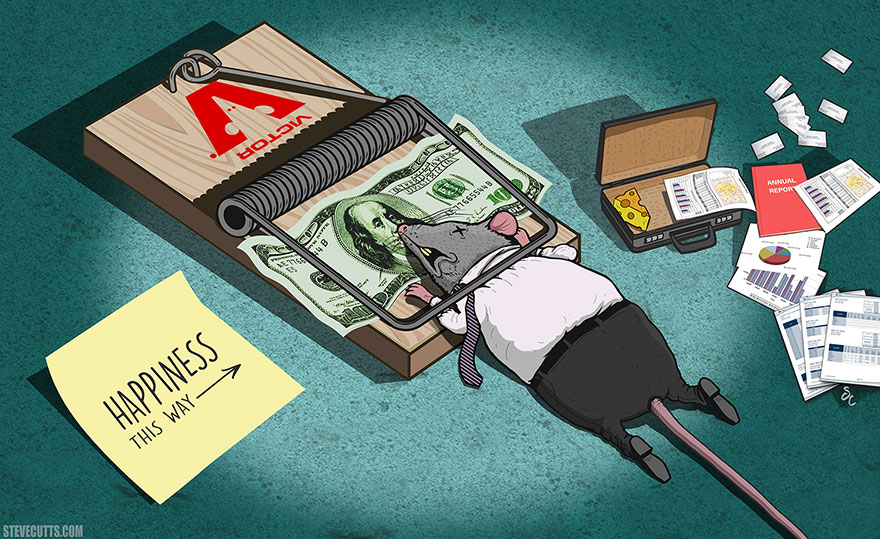The Brutal Presentation of Modern Society in The Play ‘Shopping and F***ing’

Have you thought about how our society is ‘improving’ lately? You would say ‘Of course, I do it all the time, after all I am a part of the society.’ But have we really acknowledged what is happening around us or maybe we prefer turning a blind eye to some unpleasant issues? Technology is advancing in a dazzlingly quick pace, together with our voracious desire for owning new things, the gap between the rich and the poor is becoming larger and deeper, our indifference and apathy also intensify to a huge degree. It seems that consumerism is in the heart of the development of our modern age. The play Shopping and Fucking examines this issue, and many more, with the most brutal, straightforward and honest means.
A quick summary
This work is the first full-length play by the English playwright Mark Ravenhill. It was first performed in London on 26 September 1996. Shopping and Fucking is the prime exemplar of British in-yer-face theatre of the 1990s. This term was coined in order to provide a common category for works by young writers who dealt with political, social and cultural issues in a vulgar and shocking ways.
The play received a lot of mixed and controversial reviews upon its premiere. Since then, its audience and readers’ reactions haven’t changed much. Many are still horrified by the sexually violent scenes, which include raping of an underage male by other males, nudity, pornography, combined with scenes of drug intoxication, vomiting and swearing – actions, which are not usual for a play and definitely unexpected in a theatre. The play begins with a story about how Mark bought Lulu and Robbie from another guy who didn’t want them anymore and thought they were rubbish. It begins with the question of human value nowadays. Mark recounts how he bought two human beings in a supermarket, on a hot summer day, for twenty bucks. It then goes further by retelling the story of Gary (a fourteen-year-old male prostitute) who was, at a very young age, a victim of rape by his father and tried to search for help but was faced with the insane and inadequate system of bureaucracy. We also see Mark’s battle – he was a former ‘druggie’ who now has to go to a mental institution due to his psychic disorder (he tends to identify himself solely on his relation to other people). When he goes away, Lulu and Robbie are left alone and are forced to sell drugs and work on a sex phone only to manage to get by.
Beneath the surface
When one first experiences the play they might not feel able to apprehend its true significance and value. This is chiefly because most people are not used to this kind of play, whether in text or performance. The genre is difficult and aims to unsettle and affect its receiver. However, if we look closer, we’ll see how many layers of meaning are hidden beneath the visually perplexing and disturbing content. The emotional and affective landscape is a vast one. The reader is confronted with various questions about the value of a human being in a world where everything can be bought because everything is for sale. Genuine relationships are replaced by ‘transactions’, turning physical intercourse into simple trade and nothing more. The play goes even further. Brian, who is a drug dealer, reveals a horrifying inference “Because, at the end of the day, at the final reckoning, behind beauty, behind God, behind paradise, peel them away and what is there? … Money.”

Consumerism is set to be the invisible power which makes the world go round and money is its fuel. As a result, all moral codes and ethical values are being obliterated. Love, intimacy, beauty the most sacred virtues are denied and replaced by the mere lust for money and power. The pursuit of happiness is transformed into the pursuit of cash. In scene fourteen, Brian remembers a story from his childhood when his father had asked him what the first words in the Bible were. He recounts his father telling him “Son, the first few words in the Bible are… get the money first. Get. The Money. First.”
The subject matter doesn’t exist only in its imaginative realities. It brings forward a quite realistic and startling experience. It tackles many problems of our everyday lives, which we tend to bypass. A young woman (in this case – Lulu) is forced to steal ready-to-serve food in order to survive and not die of hunger instead of, for example, going to university or doing the things she likes (in one scene she says she wanted to become an actress). In another scene we come across the topic about sexual assault when Gary says “Horrible int it? Little kid with his arse bleeding.” Trying to ignore the current situation of our rotten society may be sometimes preferable and easy, but Shopping and Fucking doesn’t offer us that possibility. It confronts us face to face with the most difficult and painful decisions one is obliged to make. In one scene the dialogue between Lulu and Robbie, which takes place after exhausting work on a sex phone, is candid and holds a frightening truth about humanity. When Lulu utters “Why are there so many sad people in this world?” to which Robbie replies “We are making money”, the popular misconception that money will make you happy is certain and clear. Feelings, empathy, everything that makes us human is replaced with the longing for material possessions.
The aim of the play is not simply to represent aspects of consumerism and sexuality rampant in popular culture such as drugs, shoplifting, phone sex, prostitution and same-sex relationships. Rather, by doing so, it urges its readers to really think about those social and moral issues. Although this is a hyperbolic depiction of reality, the subject of moral values being obliterated is a real and palpable one. The formula for success seems to be money and material possessions. Kindness, loyalty, honesty are useless traits. Even more – they hinder one’s attempt to climb the ladder of prosperity. Where is the root of that terrible turn of events? The play suggests that we are too blind to see that the answer is right in front of us. The abjection and the salvation are both embedded in ourselves, waiting for us to decide which one to feed. The sad truth is that most of the time, consciously or not, we choose to feed our demons. In scene five, Lulu tells a horrifying story – she has been a witness of a young girl who is working in a shop being stabbed to death by a drunk man over a quarrel about package of cigarettes. Instead of calling an ambulance or the police, Lulu takes advantage of the situation to steal a bar of chocolate and then walks away. She is shocked and confused by what she had done, but blames everything on the lack of money. Money then, again, appears to be the solution to everything. The work relies on blunt and brutal means for conveying its messages which is the only way to approach such a tough, existential discourse. The encounter with Sadean, Marxist and Freudian philosophies offers a wide range of topics for consideration but gives no direct answers whatsoever. It is up to us to decide whether to extract or to ignore the essence of the moral lessons.
Breaking the chains
We have reached that time of our social evolution when we have to press pause on our busy schedules and have a moment to think about what being a human actually means nowadays. Do our wealth and expensive things make us better people, or is it the compassion we have for others? Is the value of money more important than the value of a human being? Are modern relationships built solely on pursuit of personal interests and overwhelming desire to satisfy personal needs? Can a real relationship actually flourish in the midst of a decaying, wretched, hollow world, run by hypocrisy and vice? We suddenly find ourselves on the verge between what we think is right and what society tells us to be right. Thus we continually lose the grip of our own identity and understandings. Examining the depths of such social, political and intimate dimensions, the play ends with a prophecy of the future. It is not a happy ending. It is a dark and depressing assumption that our world will continue its devastating downfall, if humankind continues to praise the destructive equivalence: money = happiness.

Work Cited
- Ravenhill, Mark, Shopping and Fucking, (London: Bloomsbury Publishing, 1996)
- Svich, Caridad, Contemporary Theatre Review, ( 13.1, 2003)
What do you think? Leave a comment.











A sad look at the consumer culture our world is entrenched in. More terrifying than anything else because it hits close to home and you can’t deny the truth it’s telling.
I love the comparison between consuming via shopping and consuming sex via shopping. Or simply consuming sex as something to be had rather than something to experience.
Thanks for your take on this dramatically engaging and a thought-provoking play.
Nice to see this published; it really came along.
Thank you so much !
Ahhh, this play is chilling and bleakly amusing at once.
The true shock of this work isn’t the drugs or the violence or the sex but the moral void in which all of that happens.
Goes with Sarah Kane’s works. Horrible but good.
I would really like to see a production of this one day to fully understand the confrontational text and how it was rightfully part of the ‘In your Face’ theatre movement in the UK in the 90’s.
Mark Ravenhill is a genius.
It clearly comments on how consumerism has become part of our societal value system and how that it is integrated into our everyday lives.
Shocking, explicit and humorous!
I went to see this play circa 1998 at the Newcastle Playhouse – I remember it being shocking, but had forgotten what a set of dystopian fragments these scenes were.
Great analysis of a great piece of work. I think I’m in love with Ravenhill’s ability to courageously portray the inner decay of his characters while not forgetting how sensible, fragile and humanlike they actually are.
really opened my eyes, thank you
Read this for my Modern British Drama class in college. It’s rough and perverse in everything it does, but it really hits the nail on the head. Absolutely love it in its horrible truth.
Maybe this world is incredibly screwed up, and maybe this play does a good job of illustrating parts of it, with added drama or without. It makes me disappointed in humanity.
Easily one of my very favourite contemporary texts.
Quite depressing view on materialism and transactions of many forms.
Interesting article about how sexuality is treated as a commodity.
Thanks for writing this article!
I agree. I am very much in the same vein of: compassion over money, but I think the situation is a lot more complex. The benign epiphany of: “Money does not equal happiness” is a fairly cliche approach to society’s infatuation with money–and almost feels normalized within American culture to such an overused degree that the phrase is more akin to a nice Hallmark card. However, I am very interested in the play. It sounds very interesting, and perhaps a lot more complex than depicted. Thanks for the interesting read and directing my attention to “Shopping and Fucking.”
A bit shocking if you ask me but also eye-opening. Thanks.
I would love to see this play after reading the article. It sounds as if the playwright provides a completely accurate although of course hyperbolic representation of our contemporary society. It is sad to think there are people that deny this. We must be shocked in order to see and absorb the true reality around us.
Interesting article. The piece reminds me of a painting by Barbara Kruger which reads “I shop therefore I am” (1987). The effects of commodification are subtly presented by the play under review.